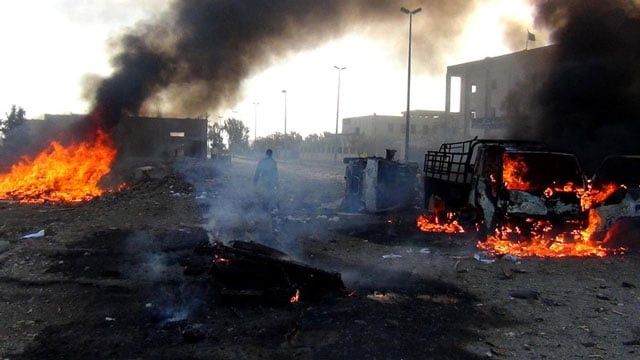Islamic State finance chief killed in Iraq air strike: US
Saleh was killed as part of the US-led coalition's campaign to destroy IS's financial infrastructure, US envoy tweeted

PHOTO: AFP
Abu Saleh was killed in late November, US military spokesperson Colonel Steve Warren said in a videoconference from Baghdad, calling him "one of the most senior and experienced members" of the group's nefarious financial system.
US air strike targets 'Jihadi John' in Syria: Pentagon
"Abu Saleh was the third member of the finance network that we have killed" recently, Warren added, likening him to a finance minister for the extremist group, which grabbed swathes of Iraq and Syria in a brutal offensive of beheadings and forced religious conversions.
Abu Saleh was killed along with two associates as part of the US-led coalition's campaign to destroy the extremists' financial infrastructure, Brett McGurk, Washington's envoy for the anti-IS fight, said on Twitter.
Real name Muwaffaq Mustafa Muhammad al-Karmush, the US State Department's terrorist blacklist describes him as a 42-year-old Iraqi.
IS confirms killing of number two in US air strike
"Killing him and his predecessors exhausts the knowledge and talent needed to coordinate funding within the organization," Warren said, adding that two other henchmen in IS fundraising networks also were killed in coalition air strikes in Iraq in late November.
They were identified as Abu Mariam, an enforcer and senior leader in IS group extortion networks, and Abu Waqman al-Tunis, who Warren said coordinated IS's transfer of people, weapons and information.
Abu Mariam appears on the State Department terrorist list as Mounir Ben Dhaou Ben Brahim Ben Helal, a 32-year-old Tunisian.
"These strikes are an example of how we are able to decimate networks," Warren said.
Islamic State oil is going to Assad, some to Turkey, US official says
The coalition has been targeting IS leaders in Syria and Iraq with air strikes to try to pick apart its command structure.
After the attacks in Paris last month, the United States said it was deploying a special operations unit in Iraq that will be able to mount raids into Syria to capture or kill IS leaders.
"We want this expeditionary targeting force to make IS and its leaders wonder when they go to bed at night: who's going to be coming in the window," US Defense Secretary Ashton Carter told a Senate hearing.
In London, the US Treasury's acting undersecretary for terrorism and financial crimes, Adam Szubin, said the IS group derives most of its funding from economic activity in the territory it controls and has declared a caliphate.
It has reaped more than $500 million in black market oil sales, looted bank vaults captured in Iraq and Syria, and raised millions more through extortion.
Islamic State makes $500m a year from its oil business
But to run what amounts to a mini-state, it needs steady and renewable sources of funding, and to do that it needs access to the international financial system to move money and import supplies, according to Szubin.
"We are targeting both of these dependencies -- IS's ability to generate revenue and its ability to use that revenue," he said in a speech to the Chatham House think tank.
"Most recently, the coalition launched a military campaign -- Tidal Wave 2 -- which included precision strikes against IS's key energy assets: oil fields, refineries, and tanker trucks.
"We believe these air strikes are markedly degrading one of IS's most important sources of funding," he said.



















COMMENTS
Comments are moderated and generally will be posted if they are on-topic and not abusive.
For more information, please see our Comments FAQ